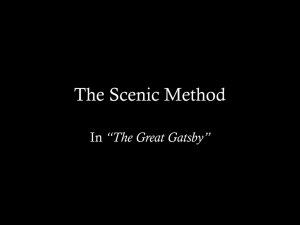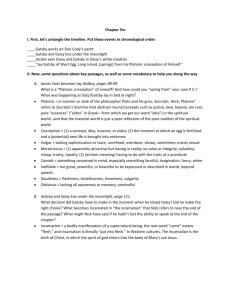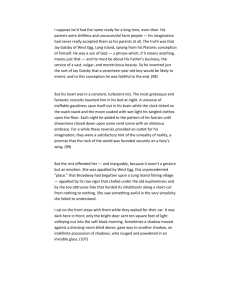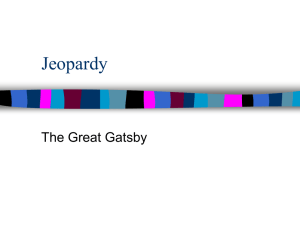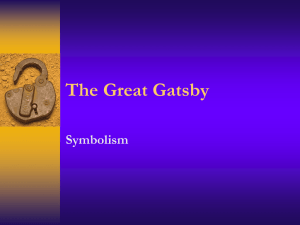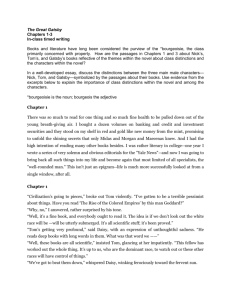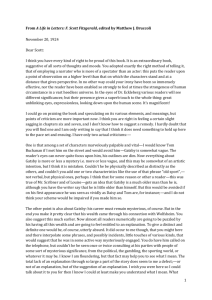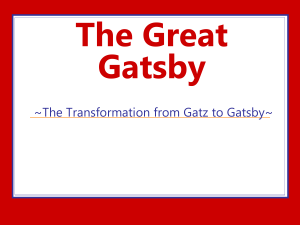Student Sample 1
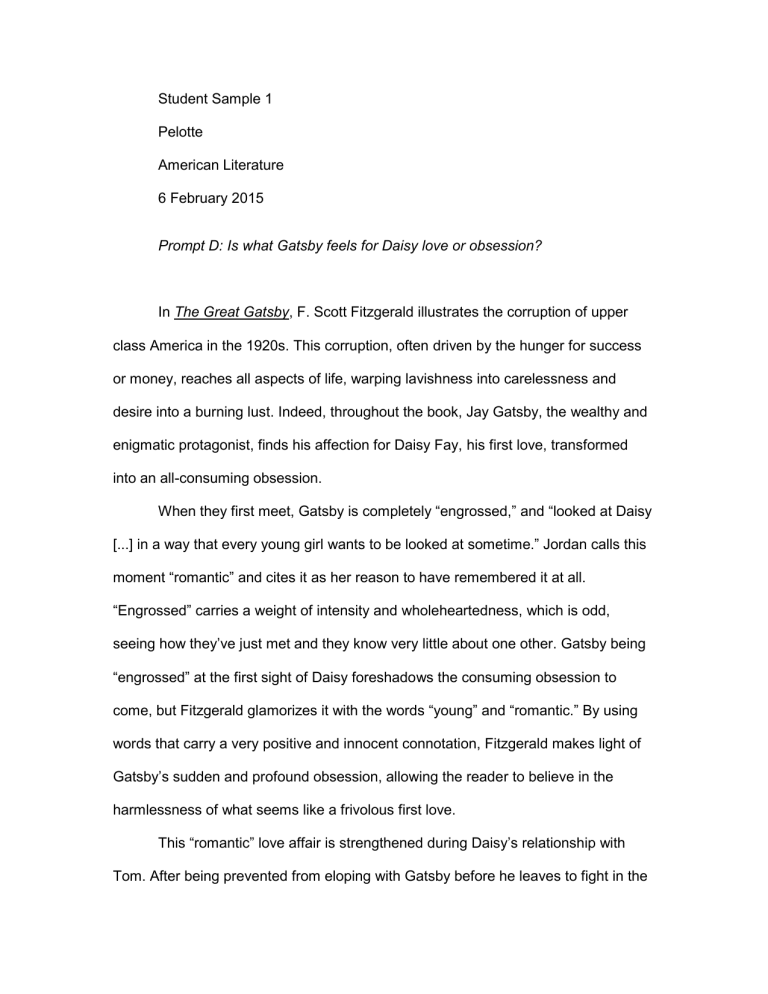
Student Sample 1
Pelotte
American Literature
6 February 2015
Prompt D: Is what Gatsby feels for Daisy love or obsession?
In The Great Gatsby , F. Scott Fitzgerald illustrates the corruption of upper class America in the 1920s. This corruption, often driven by the hunger for success or money, reaches all aspects of life, warping lavishness into carelessness and desire into a burning lust. Indeed, throughout the book, Jay Gatsby, the wealthy and enigmatic protagonist, finds his affection for Daisy Fay, his first love, transformed into an all-consuming obsession.
When they first meet, Gatsby is completely “engrossed,” and “looked at Daisy
[...] in a way that every young girl wants to be looked at sometime.” Jordan calls this moment “romantic” and cites it as her reason to have remembered it at all.
“Engrossed” carries a weight of intensity and wholeheartedness, which is odd, seeing how they’ve just met and they know very little about one other. Gatsby being
“engrossed” at the first sight of Daisy foreshadows the consuming obsession to come, but Fitzgerald glamorizes it with the words “young” and “romantic.” By using words that carry a very positive and innocent connotation, Fitzgerald makes light of
Gatsby’s sudden and profound obsession, allowing the reader to believe in the harmlessness of what seems like a frivolous first love.
This “romantic” love affair is strengthened during Daisy’s relationship with
Tom. After being prevented from eloping with Gatsby before he leaves to fight in the
Great War, Daisy swears off military men, unwilling to be reminded of the loss of her first true love. She then becomes engaged to Tom Buchanan of Chicago, and
Gatsby sends her a letter, the day before her wedding, to “‘gratulate” her, as she says. Gatsby’s willingness to send a “‘gratulat[ing]” letter to Daisy illustrates the idea that he loves her enough to want her happy, with or without him. The image of an inoffensive romance is continued until we find that Gatsby, upon returning from the
Great War, has moved across the bay from Daisy, just so that he might be close to her. This need for closeness tarnishes the idea of simple love, and ushers in a feeling of endearing but almost stalker-like devotion.
Additionally, the Midwestern inflection of the word congratulate reminds us of
Daisy’s roots in the Midwest, and the values that seem to be centered there of humility, kindness, and happiness. Nick calls Daisy’s voice “thrilling” and says that it holds a “promise that [...] there were gay, exciting things hovering in the next hour.”
Similarly, at the very beginning of the book, Nick calls Gatsby’s “extraordinary gift for hope” the representation of everything he scorned, causing Nick to crave uniformity and “moral attention.” By tying conceptual values to one person, Fitzgerald portrays them as the embodiment of these fantastical, sometimes unreachable values. In doing so, he introduces and foreshadows the idea of Gatsby building his dream around Daisy and her “thrilling” voice, much the same way Nick bases his desire for mo ral uniformity on the depressing consequences of Gatsby’s immense capability of hope.
This charming and intense devotion is illustrated when Gatsby and Daisy reunite in Nick’s parlor, and Gatsby is uncharacteristically nervous. He has
“sleepless” eyes and “vacant” stares, and his words are “uncertain” and “vague.”
“Sleepless” and “vacant” both suggest that Gatsby did not sleep at all, that he was
too tense and apprehensive about his reconciliation with Daisy to even think of resting. The words “uncertain” and “vague” carry an unsureness, a lack of confidence that completely contradicts his usual demeanor, and the reader assumes that he is acting out in his nervousness. Gatsby’s agitation over this simple meeting implies that he has not stopped loving Daisy and is anxious to see her, hinting again at a metastasizing love that runs far deeper than the harmless romance it once appeared to be.
The immense depth of Gatsby’s love is assured through the strange actions he takes in his anxiety for his reunion with Daisy. He sends “a greenhouse” to Nick to decorate the house, with “innumerable receptacles” to hold it. Gatsby did not actually send an entire greenhouse with an uncountable number of pots to Nick, but the use of “greenhouse” and “innumerable” as hyperboles illustrates how extreme and lavish Gatsby is being, as he sends so many flowers and plants that Nick cannot count them. Furthermore, Gatsby remains “strained” and “distraught” throughout his entire interaction with Daisy. “Strained” and “distraught” both have a negative connotation of feeling, and they make the scene between Gatsby and Daisy dramatic and tense. He advances this nervous tension when he blurts with
“automatic quality” that it will be “five years next November” since they’d seen each other. The immediacy of his response suggested that he knew this fact off of the top of his head, that it was familiar. Through this “automatic quality” of Gatsby’s answer,
Fitzgerald insinuates that Gatsby must think of Daisy constantly, which is indicative of Gatsby’s devotion as more than love.
As Gatsby and Daisy refamiliarize themselves with each other, Gatsby’s immense worship of her becomes obvious. He “cut[s] off” Klipspringer’s protests to playing so Daisy might hear music, and when Klipspringer complains again that
‘[he’s] all out of practice,” Gatsby “commands” him to play. Additionally, when Nick leaves Daisy and Gatsby alone, Daisy raises her hand in farewell, while Gatsby,
“didn’t know [Nick] at all now.” Gatsby is completely enthralled with Daisy now, waiting on her every need. Here, Fitzgerald leads us to assume that Daisy’s desires are Gatsby’s only priority, and he will fulfill them by any means necessary, thus illustrating how his occupation with Daisy transcends love, dawning on complete adoration.
This adoration, this obsession, is so great because it is Gatsby’s own making.
He had missed Daisy for nearly five years, and in that time, “he had thrown himself” into remembering Daisy and her “colossal vitality.” Indeed, in remembering her everyda y, Gatsby created an “illusion” of Daisy, one that she “tumbled short of” herself. He had “wed his unutterable visions” to Daisy and she became his dream. A mind that had “romp[ed] [...] like the mind of God” had created another life for itself, a better o ne, and Daisy’s “perishable breath” was the face of everything he desired.
He would not allow it to be lost in the petty infatuations of men; Gatsby would stop at nothing to “climb the ladder” and “suck on the pap of life.” This “unwavering devotion” to his “unutterable visions” is Gatsby’s obsession, both with Daisy the girl and Daisy the vision.
However, because this obsession is Gatsby’s own making, it could never yield the perfect reality he desired. He was not God, regardless of the times his mind had “romp[ed]” like God’s, and he could not “repeat the past,” however much he tried. In “wed[ding] his unutterable visions” to Daisy, he destroyed his chance of being able to see them as reality because she could never live up to these godly dreams. He had ho ped that Daisy could spin her “warm human magic,” the magic that promised “gay, exciting things,” and bring all the desires in his head to life, but
she couldn’t. She could not repeat the past and deny her love for Tom. She could not retrieve any pieces of Gatsby’s divine mind that had loved her for so long because she was not Daisy the vision. She was Daisy the girl, who felt that Gatsby was demanding entirely too much of her by asking that she “obliterate three years” and all her love for Tom.
Daisy the reality and Daisy the dream were two different entities, tied together by a man who had poured his heart into one, hoping to achieve the other. Through this stark and painful contrast between Daisy the girl and Daisy the vision, Fitzgerald illustrates the g rowth of Gatsby’s love into an obsession for a dream that “had gone beyond [Daisy], beyond everything.”

